Kaiser Health Tracking Poll: June 2014
As many employers begin to expand their wellness program offerings under new guidelines set forth by the Affordable Care Act (ACA), the latest Kaiser Health Tracking Poll finds that while the public is amenable to the idea of wellness programs in general, they do not think it’s appropriate for employers to charge workers higher health insurance premiums if they don’t participate in these programs. Further, an even larger share of the public is opposed to the idea of employers tying workers’ health insurance premiums to their ability to meet certain health goals. About half of working-age people with employer-provided health insurance say their employer offers some type of wellness program, and most of those who are offered (three in ten of all those with employer coverage) say they participate.
Public opinion on the ACA overall holds steady this month, with 39 percent of the public having a favorable view and 45 percent an unfavorable one. Compared with earlier polls, somewhat fewer now say their impression of the law is based mostly on what they’ve heard in the media, while more say they are basing their opinion on their own experience or that of their family and friends. A majority continues to say the law hasn’t had much impact to date for their own families, and four in ten say they don’t have enough information to understand how the law will impact them. Among those who are currently uninsured, the share who feel they don’t have enough information rises to six in ten.
Most Say It’s Appropriate For Employers To Offer Wellness Programs, But Not To Tie Premiums To Participation Or Health Outcomes
The ACA builds on existing policies to encourage employers to begin offering wellness programs to their workers or expand their existing programs. Guidelines released jointly by the Departments of Health and Human Services, Labor and Treasury1 include rules for both “participatory” wellness programs, which may provide financial incentives for employees to engage in healthy behavior but are not tied to an individual’s health status, as well as “health-contingent” or “outcome-based” wellness programs, which require individuals to meet specific health goals in order to obtain a financial reward. The latest Kaiser Health Tracking Poll finds that while the large majority (76 percent) of the public thinks it is appropriate for employers to offer wellness programs that promote healthy behaviors, most (62 percent) believe it is not appropriate for employers to require workers to pay more for their health insurance premiums if they don’t participate. On the question of outcome-based programs, an even larger share (74 percent) say it is not appropriate for employers to charge workers higher premiums if they are unable to meet certain health goals. Opinions are similar among those who get their health insurance from an employer; 80 percent say it is appropriate for employers to offer participatory wellness programs, but majorities say it is not appropriate for them to charge workers higher premiums if they don’t participate (62 percent) or if they are unable to meet certain health goals (75 percent).
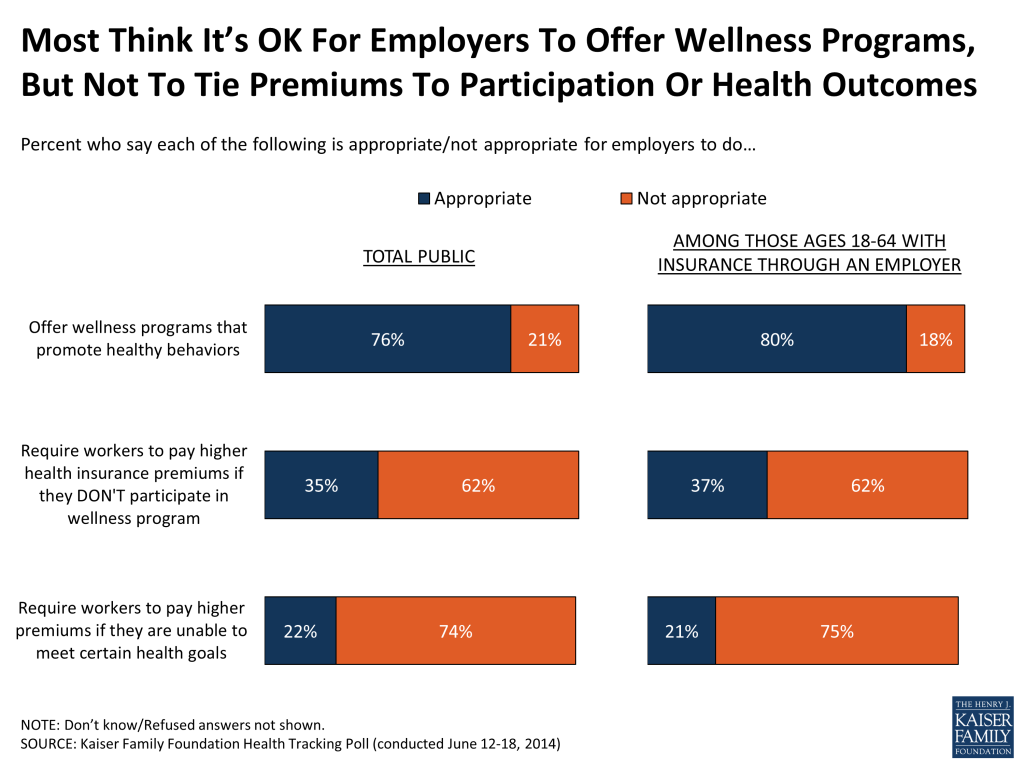
The survey also tested whether arguments for and against outcome-based wellness programs have an impact on the public’s view, and found that responses were similar with and without arguments. After hearing both an argument in favor of these programs (“workers who are unhealthy drive up health care costs and are more likely to be absent from work”) and against them (“it is an invasion of worker’s privacy and may unfairly penalize some people who are unable to meet health goals”), seven in ten (70 percent) say it is not appropriate for employers to have these types of programs, including 75 percent of those with employer-sponsored coverage.
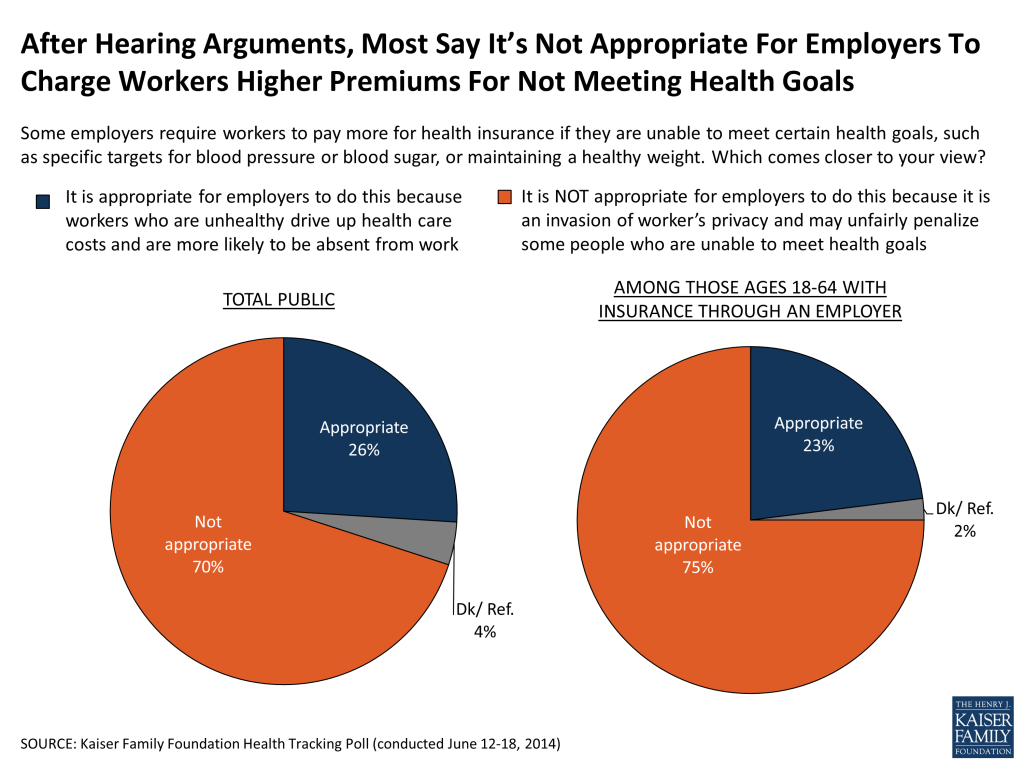
Among working-age adults who get their insurance through an employer, about half (48 percent) say their employer offers some type of wellness program, including 27 percent who say their employer offers a participatory program, 2 percent who say their employer offers an outcome-based program, and 16 percent who say they offer both types of programs.2 Among the 48 percent who say their employer offers either type of program, just over six in ten (63 percent, or 30 percent of all those ages 18-64 with employer coverage) say they participate. Reported participation rates are somewhat higher among women than men (73 percent versus 54 percent among those whose employer offers a program).
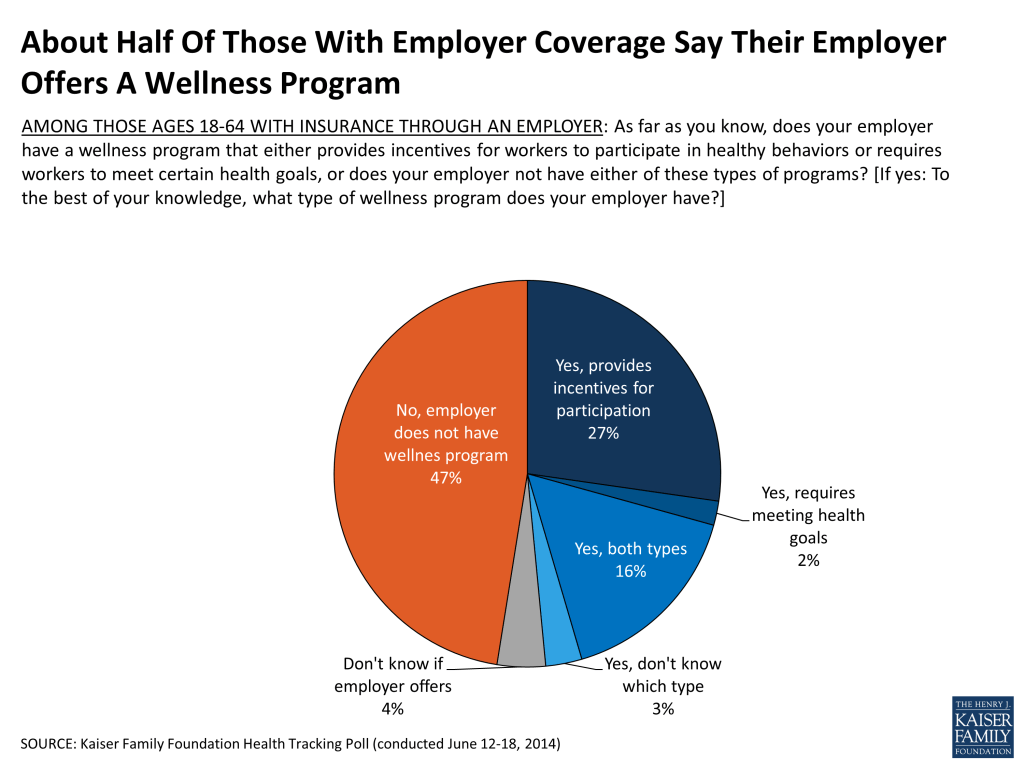
Public Opinion On ACA Holds Steady
Overall public opinion of the ACA remains about the same as it has for the last several months, with a somewhat higher share expressing an unfavorable view of the law (45 percent) than a favorable one (39 percent). Views continue to be polarized by political party, with a large majority of Democrats having a favorable view (66 percent), a large majority of Republicans unfavorable (74 percent), and independents somewhere in the middle but more negative than positive (31 percent favorable, 53 percent unfavorable).
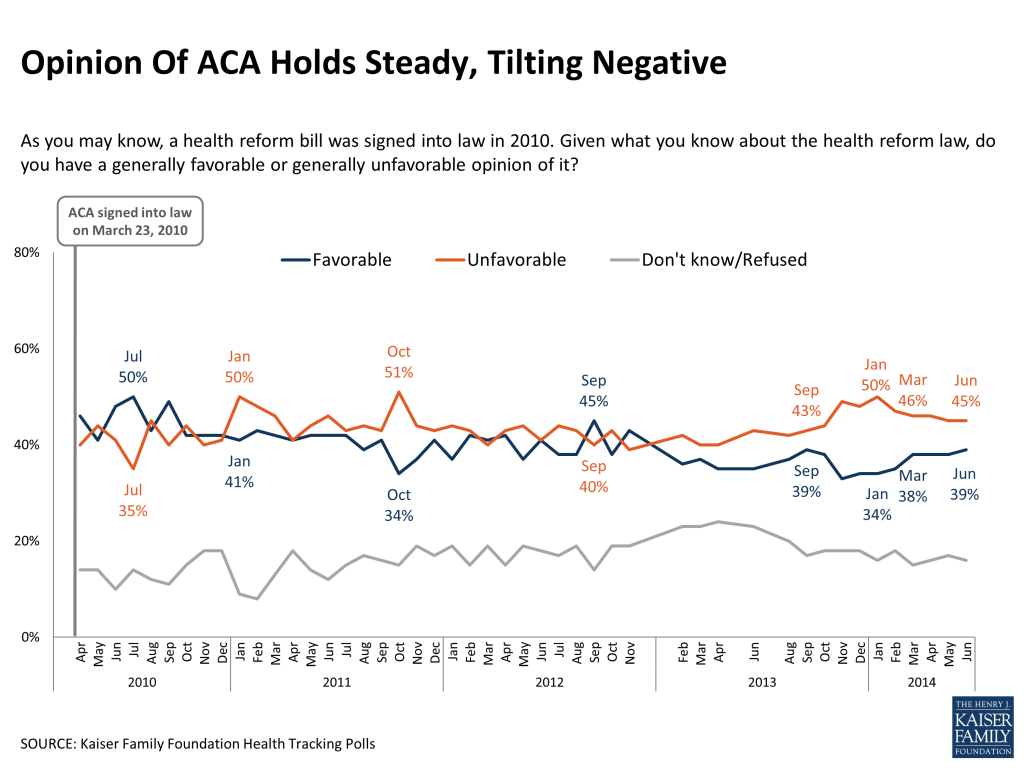
A plurality of the public (37 percent) says their impression of the law is based mainly on what they’ve seen and heard on television, radio, and newspapers, though this share has declined somewhat from earlier tracking polls in February 2014 and February 2013, when more than four in ten said their impression was based mostly on the media. There has also been a corresponding increase in the share who say their impression is based mainly on their own experience (26 percent this month) or what they’ve learned from friends and family (22 percent). For the first time in Kaiser tracking, the combined share basing their impression on their own experience or that of family and friends (48 percent) is larger than the share who report basing their view mostly on the media (37 percent). At least two possible factors may be playing a part in this change over time. As implementation proceeds, more people may be having direct experience with the law themselves or through their loved ones. It’s also possible that as coverage of the law has been out of the media spotlight for the last few months, fewer people are hearing about it in the news, resulting in a declining share who report taking cues from the media.

The survey also finds that while a majority (53 percent) say the law hasn’t made much difference for their own families, this share has declined from 62 percent in January, perhaps another indication that more people are starting to see the law having a direct or indirect impact on them and their families. The share who feel the law has left their family better off increased from 12 percent in January to 18 percent this month, but remains smaller than the 26 percent who say the law has left their families worse off. Similarly, when asked how they feel the law is impacting the country as a whole, a third say the country is better off – up 6 percentage points since January, but still trailing behind the 40 percent who feel the country is worse off as a result of the law.
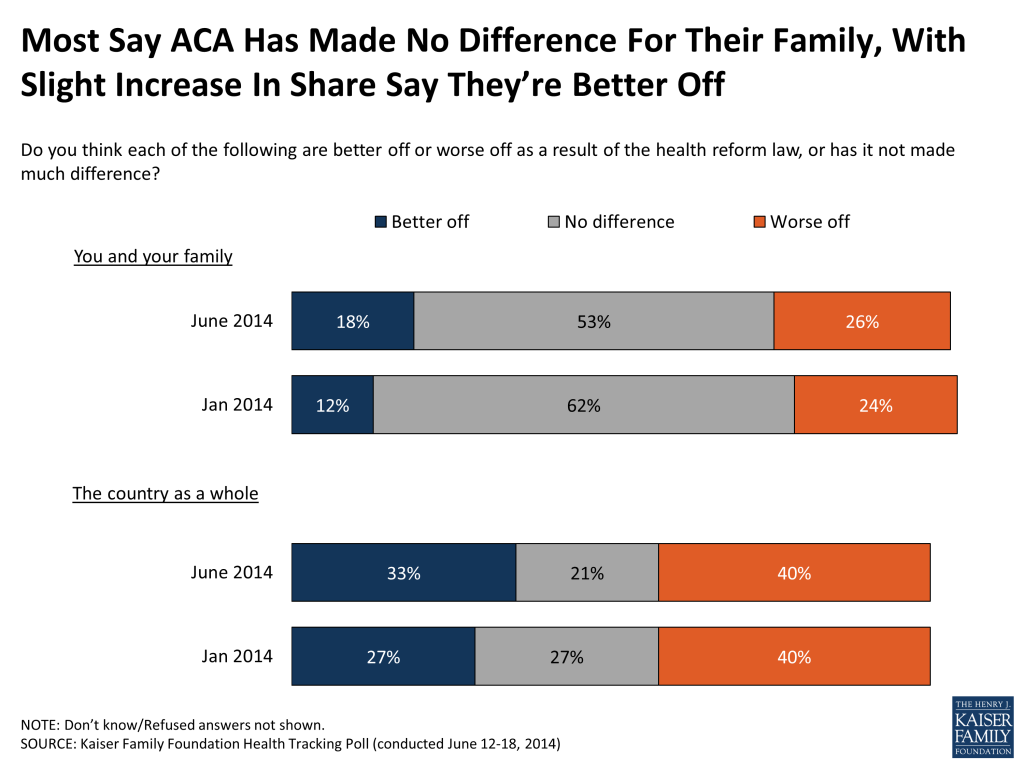
A large portion of the public remains unclear on the law’s personal impact. Overall, four in ten (40 percent) say they don’t have enough information to know how the law will impact them and their family, rising to 62 percent among those who are uninsured.
When it comes to the impact of the law on different groups, the public is most likely to believe the uninsured are better off under the ACA (43 percent), while the perceived impact on those with private health coverage is more mixed. The public is somewhat more likely to perceive a negative rather than a positive impact on people who get coverage through an employer, with 31 percent saying this group is worse off, 26 percent saying they’re better off, and about a third (35 percent) saying the law hasn’t made much difference for them. When asked about people who buy their own health insurance, a somewhat higher share of the public says this group is worse off rather than better (37 percent versus 31 percent), while one in five (20 percent) say it hasn’t made much difference. A recent Kaiser Family Foundation survey of people who purchase their own coverage found a somewhat more positive assessment among this group: 34 percent said they had benefited under the ACA, while 29 percent said they had been negatively impacted.3
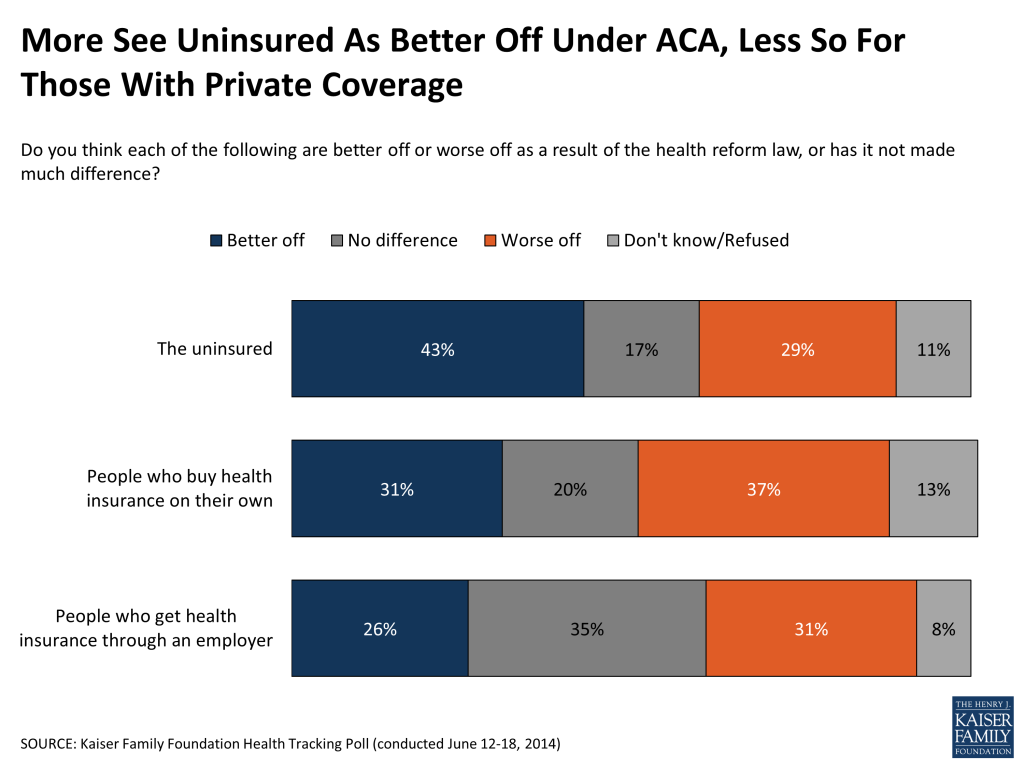
This Kaiser Health Tracking Poll was designed and analyzed by public opinion researchers at the Kaiser Family Foundation (KFF). The survey was conducted June 12-18, 2014, among a nationally representative random digit dial telephone sample of 1,202 adults ages 18 and older, living in the United States, including Alaska and Hawaii (note: persons without a telephone could not be included in the random selection process). Computer-assisted telephone interviews conducted by landline (601) and cell phone (601, including 347 who had no landline telephone) were carried out in English and Spanish by Princeton Data Source under the direction of Princeton Survey Research Associates International (PSRAI). Both the random digit dial landline and cell phone samples were provided by Survey Sampling International, LLC. For the landline sample, respondents were selected by asking for the youngest adult male or female currently at home based on a random rotation. If no one of that gender was available, interviewers asked to speak with the youngest adult of the opposite gender. For the cell phone sample, interviews were conducted with the person who answered the phone. KFF paid for all costs associated with the survey.
The combined landline and cell phone sample was weighted to balance the sample demographics to match estimates for the national population using data from the Census Bureau’s 2012 American Community Survey (ACS) on sex, age, education, race, Hispanic origin, nativity (for Hispanics only), and region along with data from the 2010 Census on population density. The sample was also weighted to match current patterns of telephone use using data from the January-June 2013 National Health Interview Survey. The weight takes into account the fact that respondents with both a landline and cell phone have a higher probability of selection in the combined sample and also adjusts for the household size for the landline sample. All statistical tests of significance account for the effect of weighting.
The margin of sampling error including the design effect for the full sample is plus or minus 3 percentage points. Numbers of respondents and margin of sampling error for key subgroups are shown in the table below. For results based on other subgroups, the margin of sampling error may be higher. Sample sizes and margin of sampling errors for other subgroups are available by request. Note that sampling error is only one of many potential sources of error in this or any other public opinion poll.
| Group | N (unweighted) | M.O.S.E. |
| Total | 1,202 | ±3 percentage points |
| Those ages 18-64 with employer-sponsored insurance | 476 | ±5 percentage points |
| Military household | 471 | ±5 percentage points |
| Non-military household | 731 | ±4 percentage points |
Endnotes
- http://www.dol.gov/ebsa/newsroom/fswellnessprogram.html ↩︎
- According to the Kaiser/HRET 2013 Survey of Employer-Sponsored Health Benefits, 77 percent of firms that offer health insurance also offer some type of wellness program, but just 10 percent of these offer financial incentives to workers who participate. The survey question asked people specifically about programs that provide financial incentives, but it’s possible that some respondents answered this question based on the fact that their employer offers some type of wellness program, regardless of financial incentives. The ACA encourages employers to increase their use of incentives in wellness programs beginning in 2014, so it’s also possible that the share of firms offering these types of incentives has increased since the 2013 employer survey. ↩︎
- https://modern.kff.org/private-insurance/report/survey-of-non-group-health-insurance-enrollees/ ↩︎